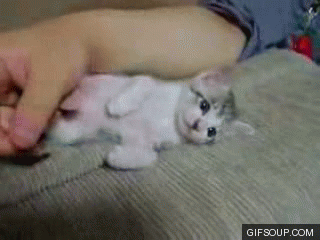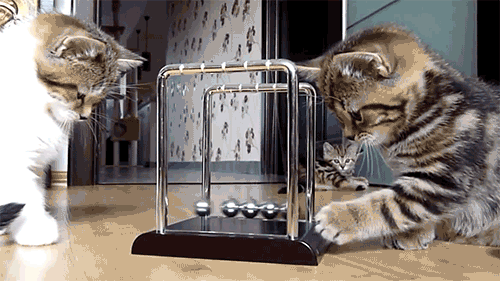-
Kitty loves noodle Comment July 1, 2015 -
Love never dies Comment July 1, 2015 -
Let God direct your steps Comment July 1, 2015 -
Kittie wants to play Comment June 30, 2015Cats may chew electrical cords because they’re bored or stressed, or because they just enjoy the texture. Chewing electrical cords is dangerous! Take the steps below to stop this behavior. Check each step as you take it until the chewing has stopped.
- Give your cat safe rubber objects to chew instead of cords. Try rubbing a rubber toy such as a Kong with tuna juice.
- Hide the cords, if possible, under rugs or strong tape so your cat can’t chew them. Or run the cords through hollow PVC pipe, cord covers, or empty paper towel rolls. Coat the cords with something that is safe but tastes bad, such as Bitter Apple, which you can find at pet-supply stores.
Source: The Humane Society of the United States
-
The best way to stay close to someone you love Comment June 30, 2015 -
Kitten very hungry and sleepy Comment June 30, 2015All cats, even cats who never interact with other animals or venture outdoors, should be examined at least once a year and receive vaccinations against rabies and other diseases, as recommended by their veterinarian. Regular veterinary visits, as well as preventative care, such as keeping cats indoors and providing good nutrition, are key to ensuring the highest quality of life for cats. Source: The Humane Society of the United States

-
Blooms unexpectedly Comment June 30, 2015Love is the flower of life, and blooms unexpectedly and without law,
and must be plucked where it is found, and enjoyed for the brief hour
of its duration. ~Unknown
-
Vipassana meditation Comment June 30, 2015Vipassana meditation at the Peace Meditation Center, Wat Kirivongsa Bopharam, in Massachusetts.
-
Love fight for kitties Comment June 27, 2015How to play with your cat: Playtime isn’t just for cats—it’s for their people, too. Your cat’s speed and grace will amaze you as she dashes about, trying to catch her “prey.”
Toss a crumpled ball of paper for her to chase—she may even bring it back to you. Some cats love to “fetch” so much that they will actually initiate the game by dropping a toy in your lap for you to throw. Source: The Humane Society of the United States
-
Kitties’ toys Comment June 27, 2015Why it’s important for cats to play: Toys and regular playtime are part of providing your cat with a stimulating environment, which makes for a happy and healthy cat. Play gives them an outlet for their energy, mental and physical stimulation, the opportunity to satisfy their instinctual hunting drive and a chance to bond with you. Source: The Humane Society of the United States













